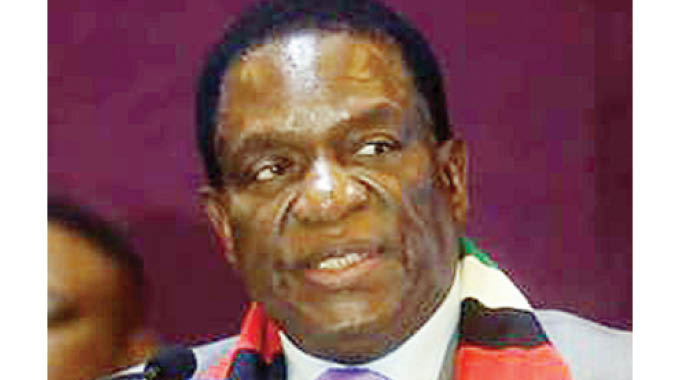‘On your marks . . .’

Stephen Mpofu
President Emmerson Mnangagwa met Ministers of State in Harare on Monday and pointed out that economic growth in provinces over which they preside must form the thrust of Zimbabwe’s devolution policy.
His remarks must be regarded as an impassioned call to all uninverted patriots in the motherland, including the ministers in point, to gird their waists for a no-holds-barred rural economic revolution that should leave in its wake some if not most development zones, or growth points, transformed into quasi-modern industrial hubs to which villagers, some of them barefoot, will troop for supplies, instead of spending meagre financial resources to distant urban centres where price tags tend to gallop out of reach at traders whims.
Were rural areas human beings, they would be saying to the powers that be: “ Why have you neglected us for 40 years after we gave birth to a political revolution that put you in the warm seats in which you remain ensconced?”
The leaders, most if not all of whom are not born-‘n locations would say in their response: “We haven’t forgotten the life-long links with our umbilical cords buried out there in our homes. But you see, yes, we kicked out the physical bodies of those without knees who for years rode on our backs but we could do nothing about their invisible, racist greed for our land and so we’ve been fighting to prevent the creation of devolution as a second war front to economic sanctions by the imperialists.
However, our sweet tongues have to a large extent made the racists to lower but not altogether down the iron blocks with which they tried to block our way forward in giving all of us a new lease of life.”
The deputisation of central government power to provincial authorities is meant to give impetus to the modernisation of rural areas with industries set up there as President Mnangagwa hinted during his indaba with the Ministers of State, to provide employment and in the process bring to an end situations whereby people gravitate between rural areas and major urban centres in search of jobs which are not readily available due to the illegal Western economic lockdown, or sanctions, by the imperialists as reprisals for the land reform programme by the Zanu-PF government that the enemy targeted for regime change.
In desperation to keep body and soul together, many jobless Zimbabweans have flocked to neighbouring countries where greener pastures beckoned to them. But as ill fate will have it, thousands of the diasporans hounded out of their jobs by the Covid-19 pandemic causing lockdowns around the globe, are returning home carrying coronavirus the killer which is daily escalating infections here at home where the economy is also facing challenges.
When the coronavirus ends and all developmental systems are go again, devolution should create a post-modern Zimbabwe that many countries will envy as they now do the country’s very, very high literacy rating on the African continent.
Command Agriculture under which irrigated winter maize is being grown to replenish food stocks depleted by drought will no doubt serve as a fillip to devolution with the Government taking other, obvious requisite measures to enhance national development.
The Command Agriculture concept as a tool for rural development also suggests that provinces with fewer or no water bodies for irrigation purposes should have these constructed for food crops, fisheries or fruits to feed the nation or for export to earn the much needed forex.
The dams will trap and conserve whatever rainfall defies global warming, the phenomenon that causes droughts that have repeatedly blighted parts of this country, causing hunger and starvation to many and forcing the Government to import food to save lives.
The Matabeleland region is a case in point for serious attention by our Government in order to equalise national development.
Renowned for cattle rearing which once earned this country much-needed forex from beef exports to the European Union, Matabeleland is also home to wildlife and boasts Bulawayo, otherwise Zimbabwe’s industrial hub which together with the people, livestock and wildlife compete for the scarce liquid that sustains all forms of life including industrial vivacity.
A delay in the much-awaited completion of the Gwayi-Shangani dam, which is set to bring water to many dry parts of Matabeleland, including Bulawayo, is an obvious aggravation of the water scarcity in this part of the country.
Add to that challenge the non-reactivation for decades of irrigation projects along the Shashi river and the Limpopo and a strong case exists here for a revisit to projects concerned in order to bolster devolution in Matabeleland South province.
At the same time, a strong opinion exists among some people in this part of Zimbabwe and who therefore feel the region should be “decongested by moving people” to other parts of the country.
In this communicologist’s opinion, mining claims owned by foreigners in our country should be revisited as a matter of urgency to ensure that raw materials from the mines are processed locally instead of being sent abroad for refining and sale, as what happens now in some cases, with no Zimbabweans overseeing the processes in question to ensure that the country gets a fair return on our natural endowment by God.
If the things discussed above are accorded the necessary attention by our Government, devolution will bring an end the Cinderella ignominy now attached to provinces or rural areas in general as they wallow in abject poverty.










Comments